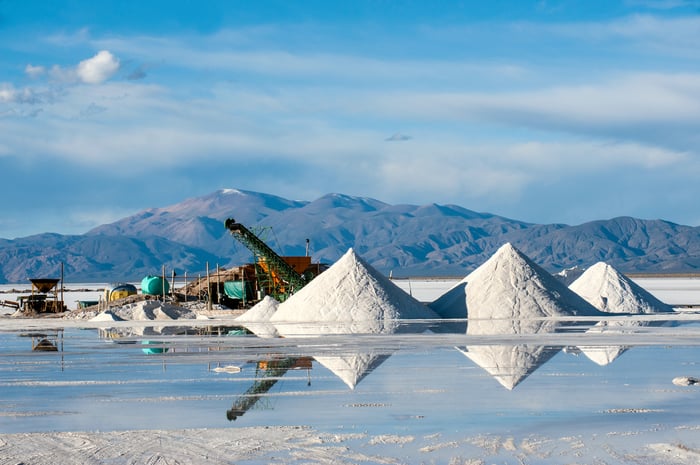Goliath lithium miner and refiner Sociedad Quimica y Minera de Chile (SQM 1.45%), or SQM, reported its second-quarter 2023 results last week; rival Albemarle (ALB 1.65%) did the same earlier this month. So, investors can now compare their results in their lithium businesses.
Demand for lithium has been soaring, driven largely by the robust current and expected future growth of the electric vehicle (EV) market. The metal is needed to make the lithium-ion batteries that power EVs.
Before we dig in, keep in mind these caveats: Long-term investors should not place too much weight on a single quarter's performance, and neither company is a pure play on lithium, so their overall results will also be affected by the performances of their non-lithium businesses. That said, the data in this article should help you make investing decisions in the lithium space.

Image source: Getty Images.
Size of lithium business relative to overall business
This category is provided for context; it's not included in the scoring.
This article uses Albemarle's energy storage segment's results as its "lithium business." This segment includes lithium sales for energy storage-related end uses, including batteries for EVs and stationary energy storage systems. The much smaller specialties segment includes some sales of the forms of lithium that have other end uses, but those are not quantifiable. Those forms are also likely much less profitable than the lithium sold for energy storage uses.
The companies don't use the same metric to measure the profitability performances of their business segments.
| Company | Lithium Business Percentage of Total Revenue in Q2 2023 | Lithium Business Percentage of Total Key Profitability Metric in Q2 2023 |
|---|---|---|
| Albemarle | 74% | 90% of company's adjusted EBITDA |
| SQM | 71% |
Approximately 76% of consolidated gross profit* |
Data sources: Company earnings reports. EBITDA = earnings before interest, taxes, depreciation, and amortization. *This number should be very close, but might not be exact because it had to be calculated using a metric input that SQM terms as "approximately."
Winner: N/A
Both companies have a little diversification, which is usually a positive, at least over the long term. Investors looking for a pure play on lithium should explore U.S.-based Livent. (You can read about Livent's Q2 earnings here.)
As for their diversification, Albemarle's segments also include specialties and its Ketjen subsidiary. Specialties includes the bromine business plus lithium specialties, which sells lithium products other than those used to produce EV batteries and other energy-storage-related products. Ketjen provides catalysts for the petrochemical, refining, and specialty chemicals industries.
SQM's non-lithium businesses include specialty plant nutrients, iodine and derivatives, industrial chemicals, and potassium.
Lithium business revenue growth
| Company | Q2 2023 Result |
|---|---|
| Albemarle | $1.76 billion, up 120% year over year |
| SQM | $1.46 million, down 21% year over year |
Data sources: Company earnings reports.
Winner: Albemarle
If this contest were a Lithium Olympics of sorts, the U.S. would get the first win. I'll reiterate what I wrote in the first quarter, where the same dynamic existed:
It seems safe to assume that the main reason for the huge discrepancy in their revenue growth rates relates to contracts with customers. SQM was likely more exposed to the spot (or market) prices of the battery-grade lithium compounds (lithium carbonate and lithium hydroxide) that it sells because these prices declined drastically from their all-time peaks late last year. [Prices have recovered somewhat since earlier in 2023.]
One can probably assume that Albemarle's management is somewhat more conservative than SQM's with respect to tying its lithium contracts with customers to spot lithium prices, which can be extremely volatile.
Lithium business profit growth
The companies don't use the the same metric to measure the profitability performances of their business segments. But that doesn't matter for this category, as it measures year-over-year growth in profitability.
| Company | Q2 2023 Result |
|---|---|
| Albemarle | $932 million adjusted EBITDA, up 93% year over year |
| SQM | $645.4 million gross profit, down about 19% year over year* |
Data sources: Company earnings reports. *These numbers should be very close, but might not be exact because they had to be calculated using a metric input that SQM terms as "approximately."
Winner: Albemarle
Albemarle is the victor again. The core reason is the same as discussed in the revenue section.
And the winner is... Albemarle
Albemarle takes the gold medal in this exercise, as it won both scoring categories.
In addition to the caveats mentioned at the top of the article, there are also other factors to explore when deciding between which stock to invest in within a specific category. These include dividend policy, financial strength, and stock valuation.
In some cases, there are also geopolitical considerations. This is one of those cases. SQM is based in Chile, which increases its currency and political risk levels relative to U.S.-based Albemarle.





